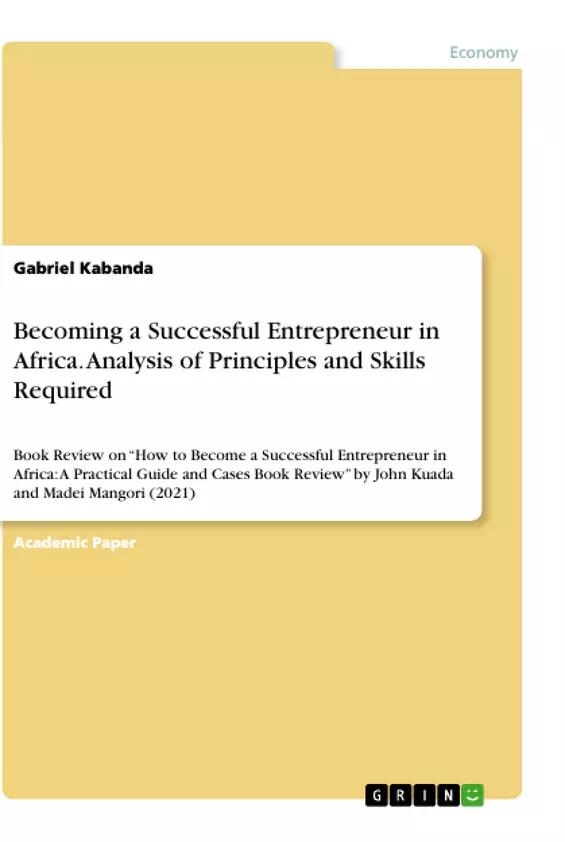The book under review titled “How to become a successful entrepreneur in Africa: A Practical Guide and Cases Book Review” was authored by Emeritus Professor John Kuada and Professor Madei Mangori (2021).
The book covers the principles in Part One, about 15 case studies from Botswana, Ghana, South Africa and Zimbabwe, and the selected profiles of the business entrepreneurs are shown in Part Three. Part Two of the book is centred on the profiles of successful African entrepreneurs and stories of various business people.
The book is quite rich in principles and integration of competence skills required in establishing and growing a business. The authors suggested a winning strategy. An alternative approach to the research methodology includes the integral research architecture comprising empirical phenomenology, storytelling, grounded theory, and case study.
A Social business dimension is proposed to lift up the level of development in the disadvantaged communities, so that the success of the entrepreneurs will also lift up the standard of living of the neighboring communities.
Inhaltsverzeichnis (Table of Contents)
- Analytical Exposition: Part One
- Mindset as the First Key to Business Success
- Making Profits for a Purpose
- Growing Businesses
- Designing a Winning Strategy
- Managing Efficiently and Effectively
- Developing and Maintaining Trust with Business Partners
- Managing Employees Well
- Choosing an Appropriate Leadership Style
- Communicating with Maturity
- Engaging in Fast Learning
- Generating and Sustaining Positive Human Energy
- Managing Time Effectively
- Putting Customers at the Centre of Management Decisions
- Financial Health Assessment
- Mindset as the First Key to Business Success
- Critical Context - Profiles of Successful African Entrepreneurs
- The stories of:
- Mr Thatayaone Dichaba
- Dr Collen Msasanure
- Mr Davidson Norupiri
- Mr Chenjerai Tsuro
- Mrs Edna Mulurazhizha
- Ms Wendy Luhabe
- Reflections on the Profiles
- The stories of:
- Integrative Conclusion - Case Studies
- 1. Farmer Business (Pty) Ltd
- 2. Shareholder Growth Sustenance (Pty) Ltd
- 3. Waste Management Pro (Pty) Ltd
- 4. Botho Country Lodge (BCL) (Pty) Ltd
- 5. ProductionPro (Pty) Ltd
Zielsetzung und Themenschwerpunkte (Objectives and Key Themes)
This book aims to provide practical guidance for entrepreneurs in Africa, both those already established and those considering starting a business. The authors draw on real-life case studies and the experiences of successful African entrepreneurs to offer insights and solutions to the challenges faced by entrepreneurs on the continent.
- Essential principles for entrepreneurial success in Africa
- Challenges and opportunities faced by African entrepreneurs
- Case studies highlighting successful African businesses
- Strategies for managing businesses effectively and sustainably
- The importance of a social business dimension in promoting development
Zusammenfassung der Kapitel (Chapter Summaries)
Part One of the book delves into essential principles for entrepreneurial success in Africa. It covers a wide range of topics, including developing the right mindset, managing finances effectively, cultivating strong relationships with business partners, and fostering a positive work environment.
Part Two focuses on the stories and profiles of successful African entrepreneurs from various sectors and countries. These profiles offer valuable lessons and insights into the challenges and opportunities faced by entrepreneurs in different contexts.
Part Three presents case studies of successful businesses, offering detailed analysis of their operations, strategies, and challenges.
Schlüsselwörter (Keywords)
This book explores key concepts related to entrepreneurship in Africa, including principles of success, challenges and opportunities for entrepreneurs, case studies of successful businesses, and the integration of social business dimensions.
- Citar trabajo
- Professor Gabriel Kabanda (Autor), 2021, Becoming a Successful Entrepreneur in Africa. Analysis of Principles and Skills Required, Múnich, GRIN Verlag, https://www.grin.com/document/1150265



